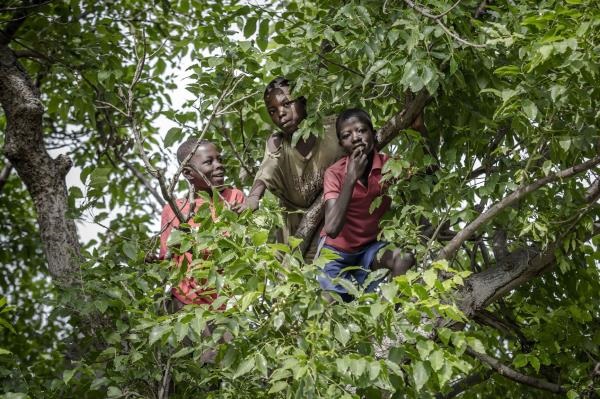
19 March 2021, Rome - Opening the high-level ceremony to mark the International Day of Forests, the Director-General of the Food and Agriculture Organization of the United Nations (FAO), QU Dongyu, today described forest restoration as a path to global recovery and well-being.
"Healthy forests mean healthy people. Forests provide us with fresh air, nutritious foods, clean water and space for recreation, and also for civilization to continue," the Director-General said.
More than 1 billion people depend on forest foods and 2.4 billion people use fuelwood or charcoal to cook their daily meals, noted the Director General. "Forests are also green pharmacies. In developing countries, up to 80 percent of all medicinal drugs are plant-based."
Yet, despite their importance, the area of forests continues to shrink. FAO's most recent Global Forest Resources Assessment states that each year, the world loses more than 10 million hectares of forest - an area about twice the size of Costa Rica. "We can change this. We have the knowledge and the tools," said the Director-General.
"Restoring forests - and managing them more sustainably - is a cost-effective option to provide multiple benefits for both people and the planet. Investments in forest restoration" Qu continued, "will contribute to economic recovery from the COVID-19 pandemic by creating green jobs, generating livelihoods, greening cities, and increasing food security."
The FAO Director-General said that "Forest restoration offers us a solution to build back better and achieve the future we want. Let us all become part of the ‘Generation Restoration' and restore the planet for better production, better nutrition, better environment and a better life. And finally, we can have a better world, a better civilization to continue."
High-level participation
In addition to the FAO Director-General, this morning's International Day of Forests virtual ceremony saw Her Royal Highness Princess Basma Bint Ali, of the Hashemite Kingdom of Jordan, speak on how every tree counts to restore forest biodiversity. Claude Nyamugabo Bazibuhe, Minister for Environment and Sustainable Development from the Democratic Republic of Congo, spoke of the imperative to regreen all continents. For her part, Andrea Meza, Minister for Environment and Energy, Costa Rica, stressed, in a video message, the importance to further engage and empower people everywhere to sustainably use forests for positive change. Jutta Urpilainen, Commissioner in charge of International Partnerships at the European Commission, referred to Europe's Green New Deal, underlining the importance of international collaboration. Professor Abdoulaye Dia, Executive Secretary of the Pan African Agency of the Great Green Wall, provided an update on the Great Green Wall initiative which has the potential to transform the lives of millions living on the frontline of climate change. By video message, Malik Amin Aslam, Advisor on Climate Change and Environment, Pakistan, spoke of his country's vision for the forests of the future.
Forests and FAO's work
Forests cover just over 30 percent of the global land area, yet they contain an estimated 80 percent of the world's territorial biodiversity, home for most of the plant and animal species known to science. FAO's work in forestry is clustered around four priorities: halting deforestation and forest degradation; forest restoration, reforestation, and afforestation (the act or process of establishing a forest especially on land not previously forested); conservation and sustainable use of forests to enhance forest-based livelihoods and, lastly, improving forest-related data and information and capacities.
New publications on Drylands and Restoration
The urgent need to improve the management of the world's drylands to ensure food security and healthy livelihoods is underlined in a new FAO publication launched in a technical session following today's high-level ceremony.
Covering 41 percent of the global land area and home to 2.7 billion people, drylands supply about 60 percent of the world's food production and support more than a quarter of our forests and woodlands, according to Building climate-resilient dryland forests and agrosilvopastoral production systems.
With four billion people projected to be living in drylands by 2050, the publication outlines the transformational change required to ensure the sustainability of food production systems under climate change and after COVID-19, which includes giving a greater voice to marginalized dryland populations.
FAO also launched the report, Local financing mechanisms for Forest and Landscape Restoration to highlight financing opportunities for restoration that support local-level actors, including smallholder farmers, foresters and landowners.
Observances across the globe
Every 21 March (since 2012) has been designated by the UN as the International Day of Forests. This year the date falls on a Sunday, and it is for this reason that FAO marks the Day today (Friday, 19 March). This morning's ceremony was part of numerous initiatives launched to celebrate forests; events such as tree planting ceremonies, symposiums and discussions, art exhibitions and photo competitions are taking place all weekend across the globe.
This year's observance also takes place during the first year of the UN Decade on Ecosystem Restoration which focuses on scaling up efforts to prevent, halt and reverse the degradation of ecosystems worldwide and raising awareness of the importance of successful ecosystem restoration